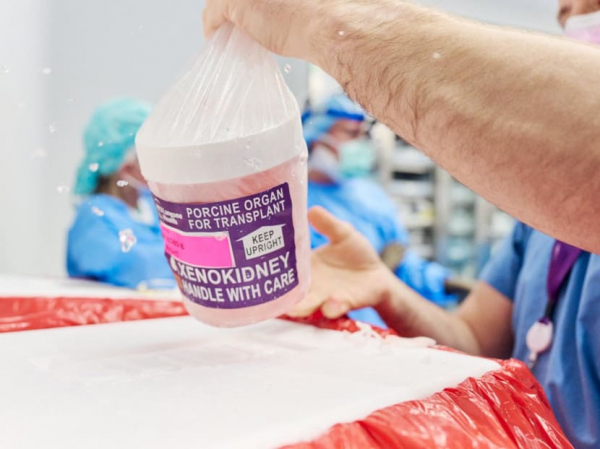Breakthrough Surgery: US Surgeons Achieve Second Live Patient Pig Kidney Transplant

In a groundbreaking medical achievement, surgeons in the United States have accomplished the second-ever transplantation of a genetically modified pig kidney into a living person, marking a significant stride in the realm of animal-to-human organ transplants. Conducted at New York University (NYU) Langone Health in New York, the procedure, undertaken in April, offered a beacon of hope for Lisa Pisano, aged 54, who faced heart failure and end-stage kidney disease, her life hanging by a thread without medical intervention.
In a pioneering approach, surgeons implanted a mechanical heart pump into Ms. Pisano in the days leading up to the transplant, a world-first for such a combined procedure, as highlighted by NYU Langone Health. Alongside the gene-edited kidney, a remarkable feat ensued as doctors transplanted the pig's thymus gland into a living patient for the very first time, augmenting the body's immune system and diminishing the likelihood of organ rejection.
Lead surgeon Dr. Robert Montgomery hailed the operation as a "milestone" in the quest to make life-saving organs universally accessible. Dr. Montgomery, who spearheaded the world's inaugural gene-edited pig-to-human kidney transplant on a brain-dead individual in 2021, emphasized that this recent endeavor brings humanity closer to a future where individuals won't have to endure the agony of waiting for organ donors.
The precedent-setting transplant of a pig kidney into a living recipient was initially accomplished in March at Massachusetts General Hospital, offering a glimmer of hope amidst the persistent scarcity of organ donors. Xenotransplants, characterized by the transplantation of organs between different species, have emerged as a promising avenue for patients in critical need. However, the potential rejection of animal organs by the human body necessitates genetic modifications to ensure compatibility and mitigate risks.
While genetically modified pig hearts were transplanted into two patients at the University of Maryland in 2023, both succumbed within a short span of fewer than two months. For Ms. Pisano, a grandmother hailing from New Jersey, the decision to undergo the pioneering procedure stemmed from exhausting all conventional alternatives. With prospects of finding a human kidney match dwindling due to rejection issues, she recognized the potential of her experience benefiting future patients.
Reflecting on her decision, Ms. Pisano expressed a sentiment of altruism, acknowledging that even in the event of failure, her participation could pave the way for subsequent success, offering solace to others in similar predicaments.
Dr. Montgomery provided an encouraging update almost two weeks post-surgery, noting that Lisa Pisano exhibited no indications of organ rejection. Furthermore, he expressed satisfaction with her kidney function, describing it as "perfect." These promising developments offer renewed hope for the success of xenotransplantation procedures, emphasizing the potential for genetically modified pig organs to serve as viable alternatives for patients in need.
In conclusion, the successful transplantation of a genetically modified pig kidney into Lisa Pisano represents a significant advancement in the field of organ transplantation. Dr. Montgomery's optimistic assessment of her health status, coupled with the flawless performance of the transplanted kidney, underscores the potential of xenotransplantation to alleviate the critical shortage of human organ donors. As medical science continues to push boundaries, Ms. Pisano's journey serves as a beacon of hope, offering promise for countless individuals awaiting life-saving interventions in the future.


